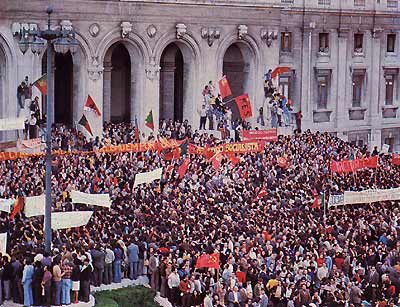Over 30 years of anarchist writing from Ireland listed under hundreds of topics
Revolution
Workers Have the Power to transform the world
In the WSM we're often asked why we spend so much time talking about the working class. Even the title of our paper, Workers Solidarity, seems a bit odd to some - why are we talking so much about workers? Isn't anarchism for everybody? And aren't we all middle class now?
Torab Saleh on the Iranian revolution - Audio
Torab Saleh who took part in the Iranian revolution of 1979 spoke in Dublin of his personal experiences of that time and the challenges it presented to him and others on the left. This is the audio recording of that meeting.
Torab Saleh on the Iranian revolution of 1979 - HOPI meeting in Dublin by Andrew Flood on Mixcloud
Anarchism & the Chinese Revolution - video and audio
A 60 minute recording of a talk and discussion on the Chinese revolution and the Chinese anarchist movement. It's available here as google video, mp4 and mp3 formats, the first two are preferred as the viewer will then be able to see the images referenced during the talk. The talk covers the period from the 1840's to the victory of the CCP in 1949.
Archive of History Educationals from the 1990's

On this page you'll find links to texts of talks given to WSM meetings dealing primarily with revolutionary periods in France, Russia, Spain and Ireland, but also more general histories, as well as accounts of some important anarchist figures of the past.
Please bear in mind that all opinions are those of the respective authors.
The Militias in the Spanish Revolution - review of The Spanish Civil War by Antony Beevan
A SURPRISING BEST SELLER last year was 'Stalingrad' by the same author. His publishers have obviously re-released this book, first published in 1982, to cash in on this. As you might expect, it is primarily a military history of the Spanish Revolution. But it is a very welcome break from the normal pattern of mainstream military histories of the Spanish Revolution. For the most part these fail to discuss the revolution within the civil war, the thousands of collectives or the role of the anarchists. If they are mentioned, they are usually portrayed as an obstruction to the efficient military pursuit of the war by the republican side.
Remembering the 1974 Revolution in Portugal
 ON APRIL 25TH 1974 a radical faction within the Portuguese Armed Forces, the MFA, revolted against the government. Until that day Portugal had been under a fascist dictatorship for over half a century. Whether the MFA was left or right wing inclined was unclear at the time. The military revolt created a space where people could effect change in their lives and the opportunity was grasped eagerly.Left-wing activists began returning from exile, and new political parties sprouted up. The parties all used the situation to gain political power in the government. Ordinary folk, in contrast, used the situation to improve social conditions in their communities and workplaces through new autonomous organisations. It was here that the true revolution was fought and is of most interest to anarchists.
ON APRIL 25TH 1974 a radical faction within the Portuguese Armed Forces, the MFA, revolted against the government. Until that day Portugal had been under a fascist dictatorship for over half a century. Whether the MFA was left or right wing inclined was unclear at the time. The military revolt created a space where people could effect change in their lives and the opportunity was grasped eagerly.Left-wing activists began returning from exile, and new political parties sprouted up. The parties all used the situation to gain political power in the government. Ordinary folk, in contrast, used the situation to improve social conditions in their communities and workplaces through new autonomous organisations. It was here that the true revolution was fought and is of most interest to anarchists.
Modern Revolutions Or Is Revolution Still Possible?
It was originally my intention to give a history lesson on the modern revolutions, with the aim of extracting what they had in common. Actually this is too big of a project, these events can not be dealt with adequately on their own in the space of 20 minutes, lump them together and you would lose everything.
What are these modern revolutions? Well in the 80's it became popular on a large part of the left to proclaim the death of the working class. Not so much from the obviously flawed position of saying nobody worked anymore, or even that modern society was no longer based around the division between wage labour and capital. No rather on the basis that the working class no longer existed as a class, ie a group of people with common interests.
Greece: War and Civil War
Greece has been a somewhat unstable entity throughout its history and particularly with the coming into being of nation states in the 18th century. Its borders have shifted, expanded and contracted on several occasions over the last 200 years leaving behind a legacy of quite virulent Greek nationalism. Greek armies were also involved in foreign intervention against the Russian revolution in north west Asia minor.
Anarchism and the French Revolution
We can examine the French revolution as a prototype of how revolutions occur and progress. Kropotkin defined it as the "mother of us all ". The ideas and methods of the French Revolution still have relevance to us today
Why be a revolutionary
I may not have any chains around my feet, but still, I am not free. In modern society - capitalism - our bosses and leaders have invented new methods to chain us. According to the propaganda we are supposed to live in a free, democratic society, yet all of us experience limitations in our lives. Everyday more of us are being flung on the dole, families are being thrown out on the streets, our pay packets are shrinking and prices keep going up. Politicians care about little else except their popularity. In truth, we all know that this free, democratic society doesn't exist on the streets where we live.

